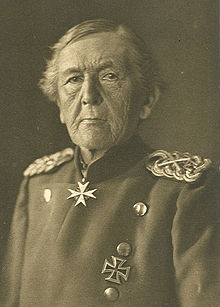
Graf Alfred von Schlieffen, generally called Count Schlieffen was a German field marshal and strategist who served as chief of the Imperial German General Staff from 1891 to 1906. His name lived on in the 1905–06 "Schlieffen Plan", then Aufmarsch I, a deployment plan and operational guide for a decisive initial offensive operation/campaign in a two-front war against the French Third Republic.

August Wilhelm Antonius Graf Neidhardt von Gneisenau was a Prussian field marshal. He was a prominent figure in the reform of the Prussian military and the War of Liberation.

Albrecht Theodor Emil Graf von Roon was a Prussian soldier and statesman. As Minister of War from 1859 to 1873, Roon, along with Otto von Bismarck and Helmuth von Moltke, was a dominating figure in Prussia's government during the key decade of the 1860s, when a series of successful wars against Denmark, Austria, and France led to German unification under Prussia's leadership. A moderate conservative and supporter of executive monarchy, he was an avid modernizer who worked to improve the efficiency of the army.

Helmuth Karl Bernhard Graf von Moltke was a Prussian field marshal. The chief of staff of the Prussian Army for thirty years, he is regarded as the creator of a new, more modern method of directing armies in the field and one of the finest military minds of his generation. He commanded troops in Europe and the Middle East, in the Second Schleswig War, Austro-Prussian War and Franco-Prussian War. He is described as embodying "Prussian military organization and tactical genius". He was fascinated with railways and pioneered their military use. He is often referred to as Moltke the Elder to distinguish him from his nephew Helmuth von Moltke the Younger, who commanded the German Army at the outbreak of the First World War. He is notably the earliest-born human to have been audio-recorded, being born in the last year of the 18th century (1800). He made 4 recordings, 2 of which are preserved to this day, they were recorded in October of 1889.

Helmuth Johannes Ludwig Graf von Moltke, also known as Moltke the Younger, was a German general and Chief of the Great German General Staff, a member of the House of Moltke. He was also the nephew of GeneralfeldmarschallGraf Helmuth Karl Bernhard von Moltke, who is commonly called "Moltke the Elder" to differentiate the two.
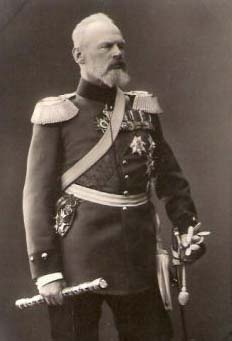
Prince Leopold of Bavaria was born in Munich, the second son of Prince Regent Luitpold of Bavaria (1821–1912) and his wife Archduchess Augusta of Austria (1825–1864). He was a Field Marshal (Generalfeldmarschall) who commanded German and Austro-Hungarian forces on the Eastern Front in World War I.

Prince Friedrich Karl Nikolaus of Prussia was the son of Prince Charles of Prussia (1801–1883) and his wife, Princess Marie of Saxe-Weimar-Eisenach (1808–1877). Prince Friedrich Karl was a grandson of King Frederick William III of Prussia and a nephew of Frederick William IV and William I.

Adrian Friedrich Wilhelm Julius Ludwig von Verdy du Vernois, often given the short name of Verdy, was a German general and staff officer, chiefly noted both for his military writings and his service on Helmuth von Moltke the Elder's staff during the Franco-Prussian War.
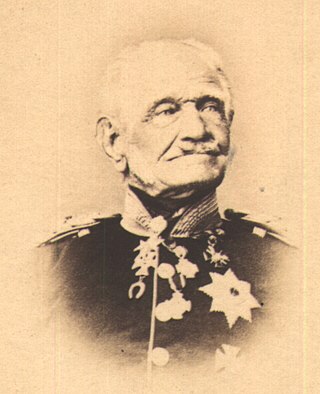
Friedrich Heinrich Ernst Graf von Wrangel was a Generalfeldmarschall of the Prussian Army.

Karl Konstantin Albrecht Leonhard Graf von Blumenthal was an officer of the Prussian Army and field marshal of the Imperial German Army, chiefly remembered for his decisive intervention at the Battle of Königgrätz in 1866, his victories at Wörth and Weißenburg, and above all his refusal to bombard Paris in 1870 during the siege, of which he was in command.

Alfred Ludwig Heinrich Karl Graf von Waldersee was a German field marshal (Generalfeldmarschall) who became Chief of the Imperial German General Staff.

Nikolaus Heinrich Ferdinand Herbert, Prince of Bismarck was a German politician, who served as Foreign Secretary from 1886 to 1890. His political career was closely tied to that of his father, Otto von Bismarck, and he left office a few days after his father's dismissal. He succeeded his father as the 2nd Prince of Bismarck in 1898. He was born in Berlin and died in Friedrichsruh.
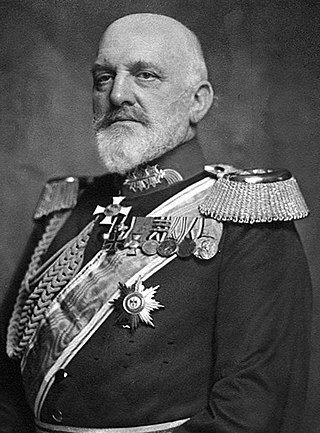
Josias von Heeringen was a German general of the imperial era who served as Prussian Minister of War and saw service in the First World War.

Friedrich Emil Ferdinand Heinrich von Kleist, granted the title Graf Kleist von Nollendorf from 1814 onwards, was a Prussian field marshal and a member of the old junker family von Kleist. He was a prominent figure in Prussian military during the Napoleonic Wars.

Eduard Ernst Friedrich Hannibal Vogel von Fal(c)kenstein was a Prussian General der Infanterie.
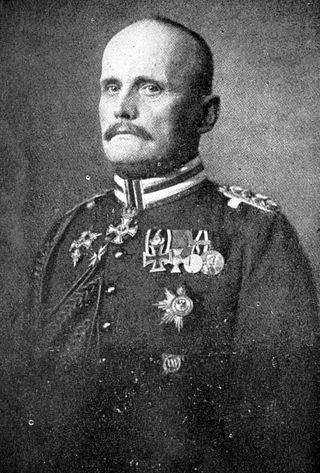
Moriz Freiherr von Lyncker was a Prussian officer of the German Empire and Chief of the Military Cabinet of Emperor Wilhelm II.

Dietrich Graf von Hülsen-Haeseler was an infantry general of the German Empire.

Günther Emanuel Graf von Kirchbach was a German Generaloberst who served during the First World War.
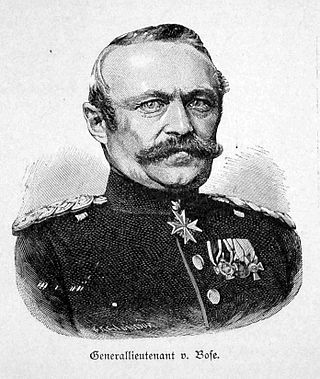
Friedrich Julius Wilhelm Graf von Bose was a Prussian general who commanded the Prussian XI Corps during the Franco-Prussian War.

Hans Georg Hermann von Plessen was a Prussian Colonel General with the rank of Generalfeldmarschall and Canon of Brandenburg. He held the office of His Majesty's Orderly Adjutant General to Kaiser Wilhelm II, thus making him one of the Emperor's closest confidants. During World War I he simultaneously served as Commandant of the Imperial Grand Headquarters.
